Key takeaways:
- Choosing the right app development tool involves balancing functionality with ease of use, as well as leveraging community support for problem-solving.
- Version control systems, especially Git, provide essential features for collaboration, tracking changes, and restoring previous versions, enhancing overall productivity.
- Git’s unique branching and merging capabilities allow developers to work independently while ensuring collaborative contributions are integrated smoothly.
- Personal experiences with Git highlight its importance in fostering community engagement and providing a reliable platform for managing development processes and mistakes.
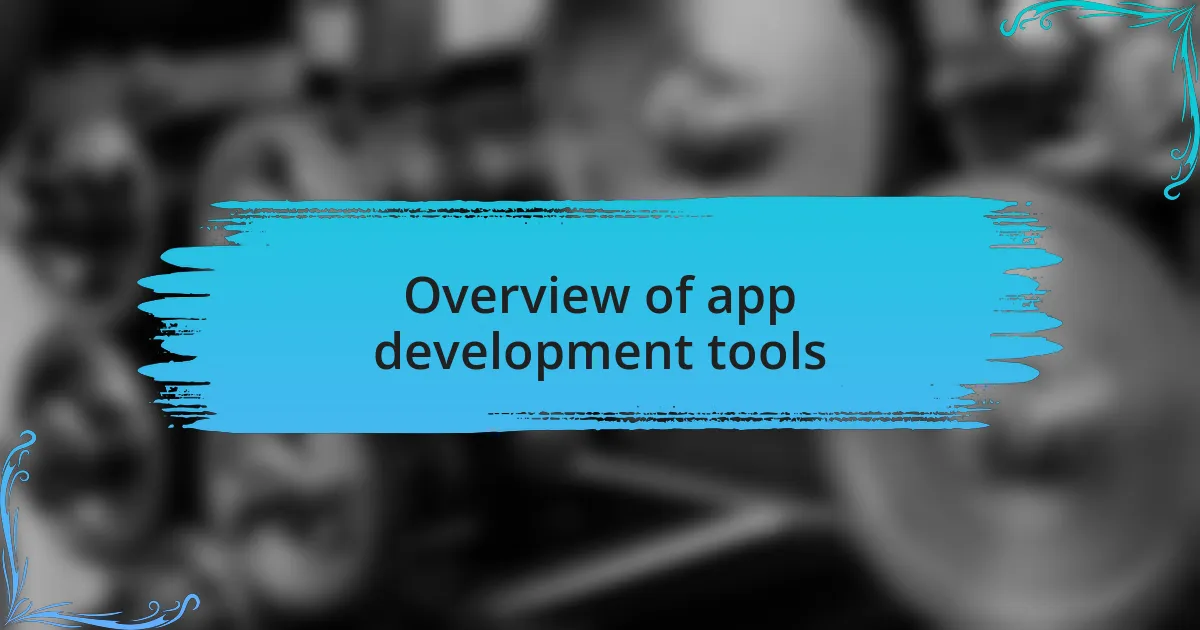
Overview of app development tools
When it comes to app development tools, the options can be overwhelming. I remember the first time I explored different tools; it felt like stepping into a buffet with countless dishes but no clear favorite. Each tool offers unique features, ranging from robust frameworks like React Native to versatile environments like Xamarin.
Choosing the right app development tool isn’t just about features; it’s about how it aligns with your workflow. I’ve had moments where I picked a tool that seemed perfect on paper, only to discover that its steep learning curve slowed down my project. Has that ever happened to you? Finding a balance between functionality and ease of use is crucial.
Moreover, the community around a tool can significantly influence your experience. I’ve found that engaging with peers who use the same tools can open doors to solutions and innovations. Have you ever tapped into community resources to overcome hurdles? When you leverage a supportive community, not only do you learn faster, but you also feel less isolated in your development journey.
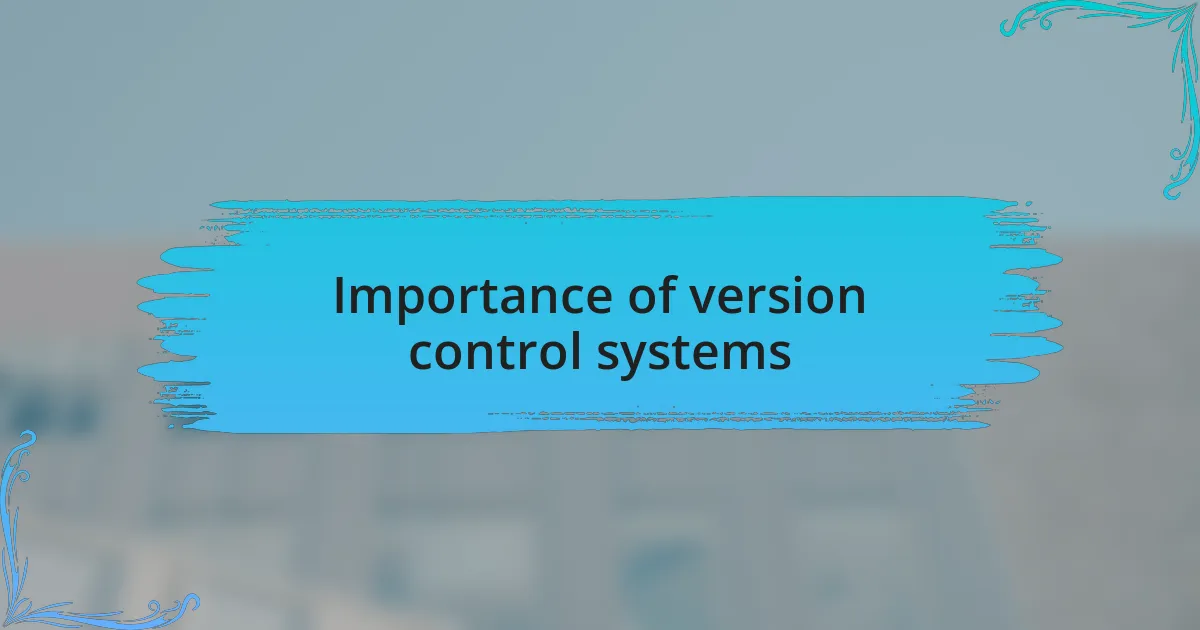
Importance of version control systems
Version control systems are essential because they provide a safety net for developers. I recall a time when I accidentally deleted crucial code from a project. Luckily, with version control, I was able to restore it easily, saving hours of rework. How would you handle such a situation without that safety net?
Moreover, they facilitate collaboration among team members. When working on a group project, I’ve seen how version control allows everyone to contribute changes without stepping on each other’s toes. The clarity it brings—knowing who changed what and when—enhances teamwork significantly, don’t you think?
Additionally, version control systems help in tracking project progress and changes over time. I often look back at previous versions to analyze how my project has evolved. It’s fascinating to see initial ideas morph into the final product. Isn’t it enlightening to reflect on our growth through these records?
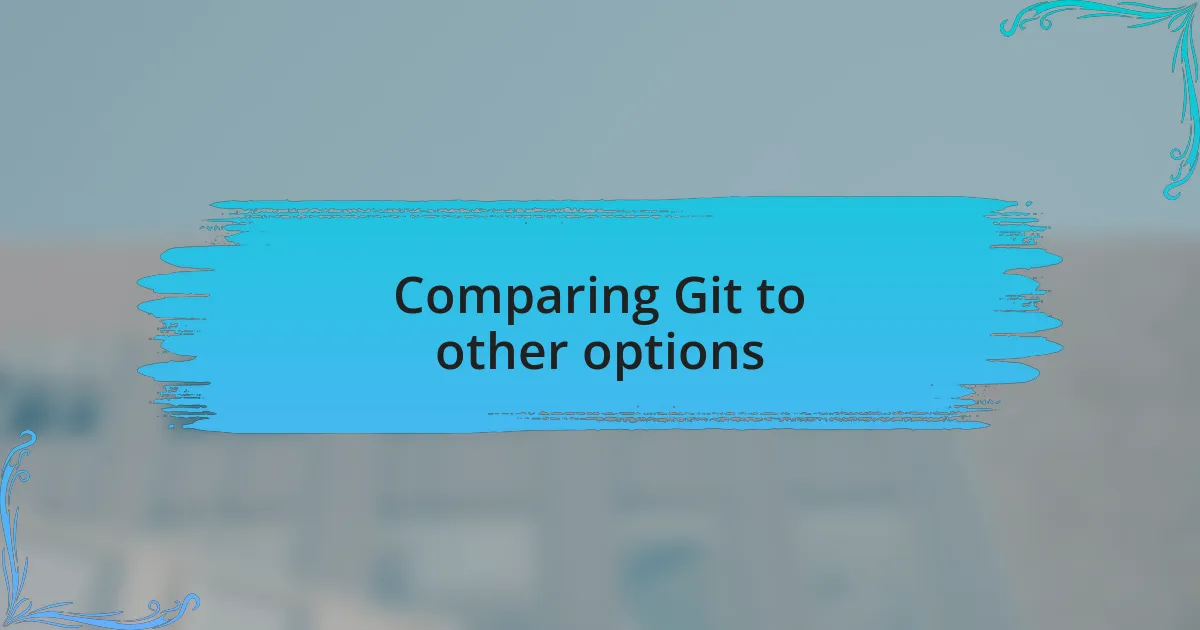
Comparing Git to other options
When comparing Git to other version control systems, I find that its branching and merging capabilities stand out remarkably. For instance, I once collaborated on a project where we had multiple features being developed simultaneously. Git’s ability to create branches allowed us to work independently while seamlessly merging our contributions later. Have you ever tried integrating code from multiple contributors using other systems? It can quickly turn into a massive headache without Git’s streamlined approach.
On the other hand, some might argue that alternatives like Subversion (SVN) can be more user-friendly, particularly for beginners. I understand this perspective—I had my own learning curve when first diving into version control. But what truly won me over about Git was its distributed nature. Each developer has a complete repository on their local machine, meaning I can work offline and still ensure my changes are saved. Isn’t it liberating to know that your entire project history is at your fingertips, even without an internet connection?
Moreover, the vibrant community and extensive resources around Git offer another compelling reason to choose it over others. I remember the feeling of being stuck on a problem, only to discover countless tutorials and forums dedicated to Git, guiding me step by step. It felt like having a mentor available 24/7. With other systems, I often felt isolated when encountering hurdles. Wouldn’t you agree that having such a support network can make all the difference in your development journey?
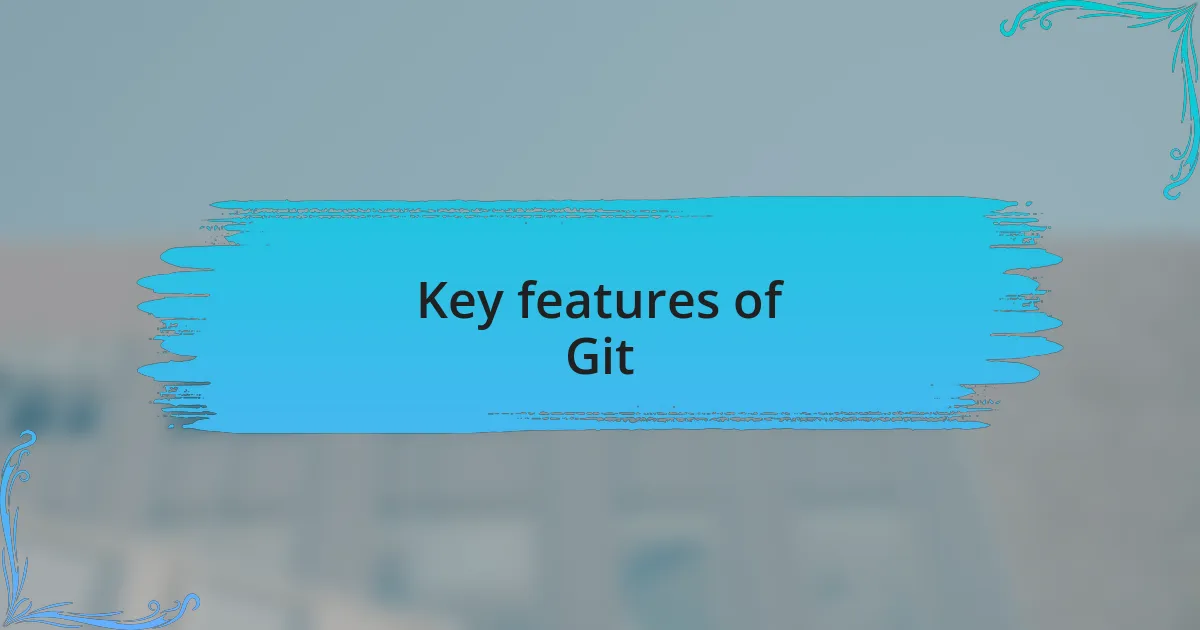
Key features of Git
Git’s branching and merging capabilities are like a breath of fresh air for developers. During one of my projects, I had to experiment with a feature while other team members continued their work. Creating a branch was a breeze; I could develop my idea without worrying about how it would affect the main codebase. Have you ever experienced that freedom? It really makes a difference in productivity.
Another key feature I appreciate is Git’s robust history tracking. Each commit acts like a snapshot of my project at that moment. I once made a significant mistake that affected our entire codebase—thankfully, I could easily revert to a previous commit. Have you ever wished you could go back in time in your coding projects? Git’s impressive tracking not only saves time but also provides peace of mind.
Git’s support for collaboration is unparalleled. Working with a team, I’ve utilized pull requests to facilitate discussions about code changes before they’re integrated. It’s almost like having a dedicated space to brainstorm and refine ideas together. Isn’t it reassuring to know that everyone’s voice can be heard in the development process? This feature fosters not only collaboration but also collective ownership of the project.
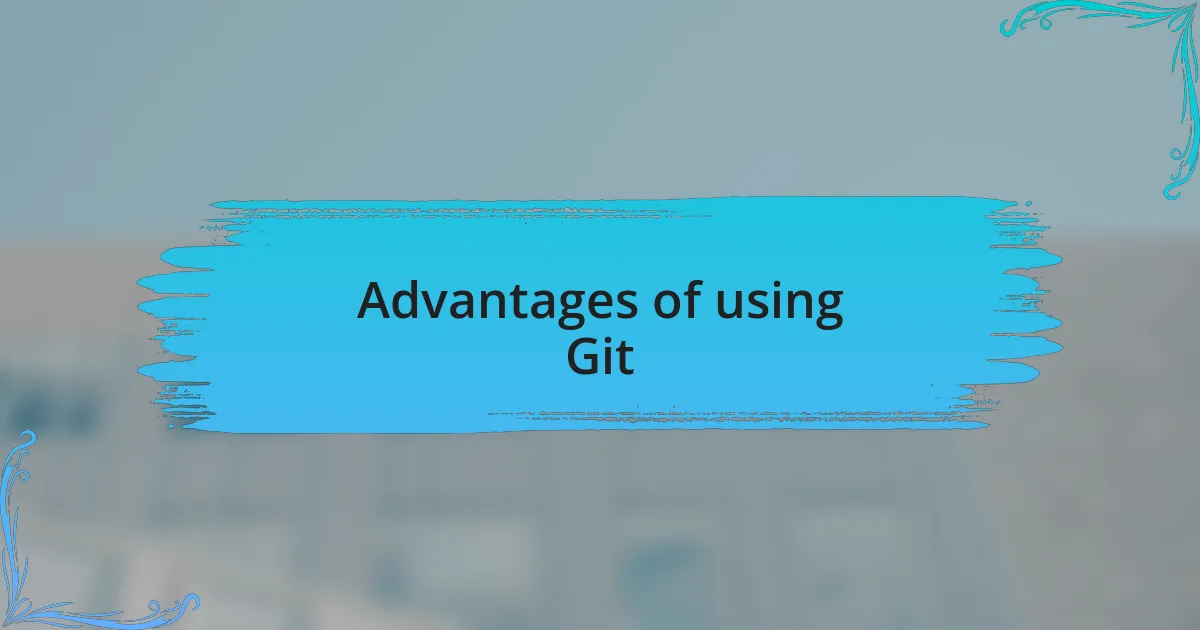
Advantages of using Git
Using Git enhances my workflow with its superior version control, making it easier to manage changes. I recall once working on a large team project where we had multiple updates happening simultaneously. Git’s ability to effortlessly combine various versions ensured that our final product was cohesive and well-organized. Isn’t it reassuring to know that potential conflicts can be managed without chaos?
Another compelling advantage of Git is its unparalleled flexibility when it comes to working with remote repositories. I’ve found that collaborating with freelancers across the globe has never been simpler. Each contributor can clone, modify, and push changes without needing to worry about overwriting someone else’s work. This made me realize how crucial it is for our modern, remote-first world where teams can be scattered but still seamlessly coordinate.
Moreover, Git’s integration with various development tools really stands out. I’ve enjoyed using platforms like GitHub or GitLab, where I can host my repositories and utilize additional features like issue tracking and continuous integration. This holistic approach to development streamlines my workflow and keeps everything in one place. How much easier is it to have all your tools working together rather than juggling between different platforms?
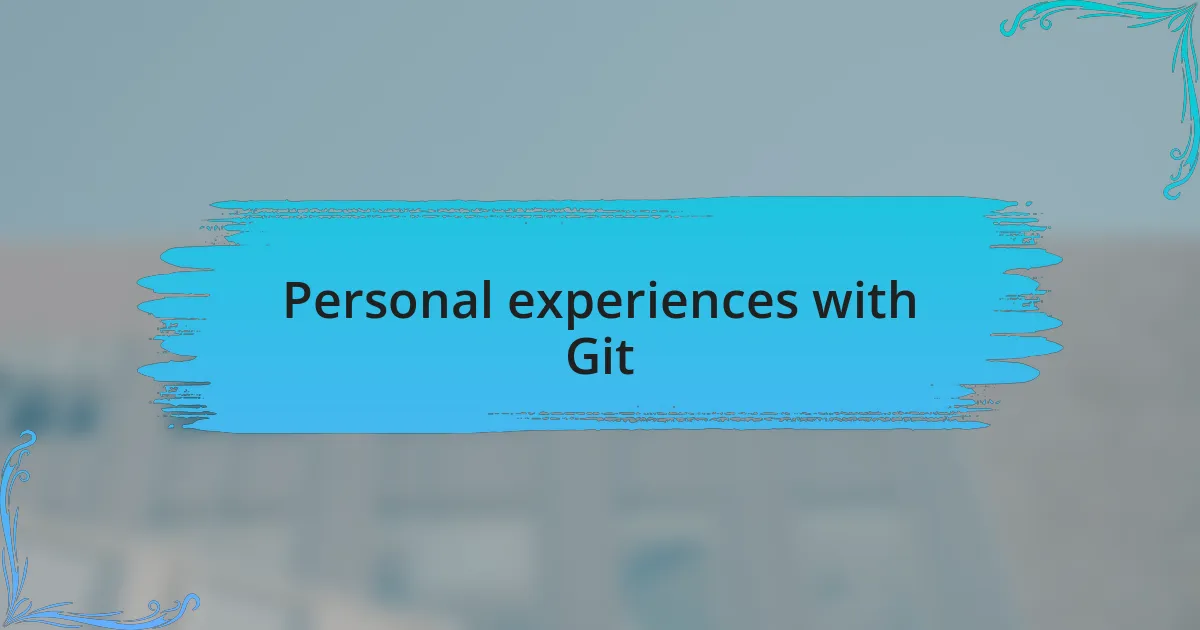
Personal experiences with Git
I remember my first experience with Git vividly. I was initially overwhelmed by the command line interface; it felt like learning a new language. However, once I got the hang of it, the sense of accomplishment was empowering. I still smile when I think about the moment I successfully resolved a tricky merge conflict on my own. It taught me that Git not only manages code but also cultivates a deeper understanding of the development process.
Another memorable moment came when I accidentally deleted a crucial branch just before a big presentation. Panic set in as I thought I had lost weeks of work. Thankfully, with Git’s robust history feature, I was able to recover everything. This incident reinforced my belief in the importance of having a reliable system that allows mistakes to become learning opportunities rather than disasters. Have you ever faced a similar situation?
Over time, I’ve started to appreciate how Git fosters a sense of community among developers. Participating in open-source projects with Git brought exhilarating moments of collaboration. Seeing my contributions make a tangible impact on real-world applications was incredibly fulfilling. There’s something special about sharing knowledge and creating something greater together, don’t you think?
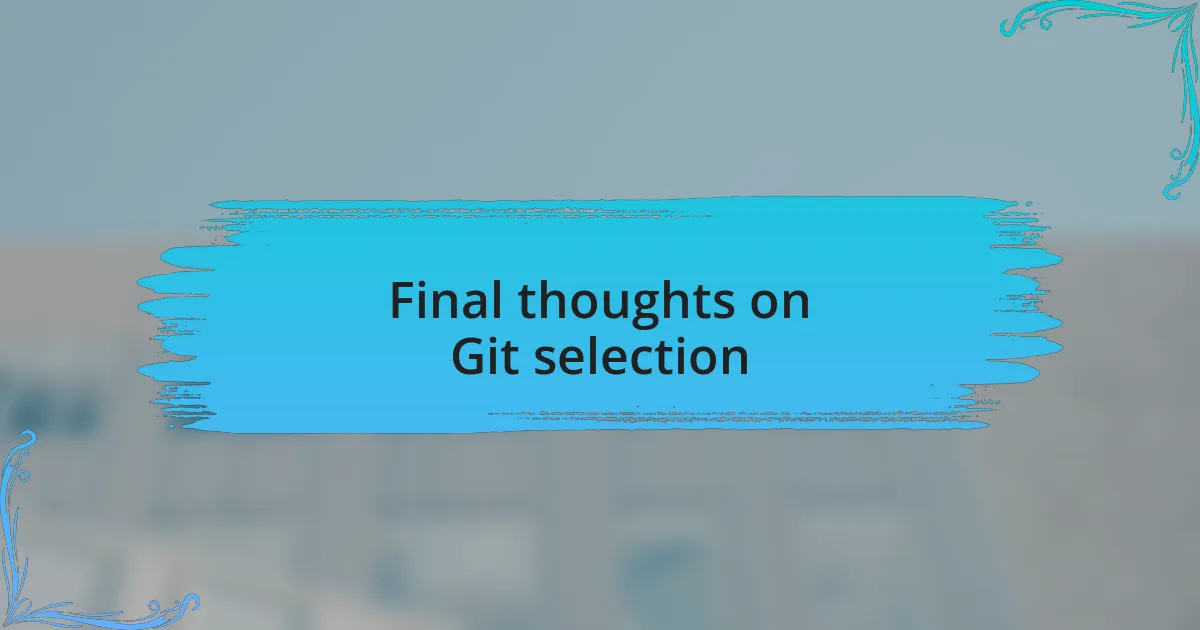
Final thoughts on Git selection
Choosing Git over other version control systems has been a game changer for my development process. I recall working on a team project where we relied on another system, and it quickly felt limiting. Git’s branching model empowered us to experiment freely without the fear of messing up the main codebase. Have you ever felt stifled by a tool that didn’t allow for creativity?
The collaborative features of Git resonate with me on a personal level. I remember joining a group of developers for a hackathon, and we faced the daunting task of merging our codebases. Git made it seamless. We could collaborate without stepping on each other’s toes. That experience illustrated how Git promotes trust and communication in a team. Isn’t it amazing how the right tools can foster better teamwork?
Looking back, I see Git not just as a tool but as a reliable partner in my development journey. The learning curve was steep at first; I even faced moments of frustration. But, overcoming those challenges deepened my appreciation for its capabilities. It’s like realizing that a tough workout leads to greater strength—what’s your growth story with Git?